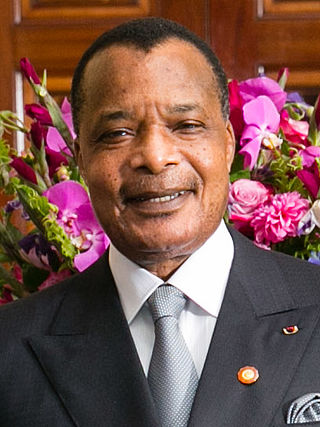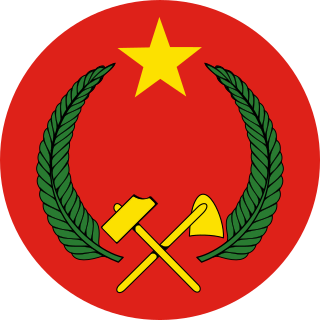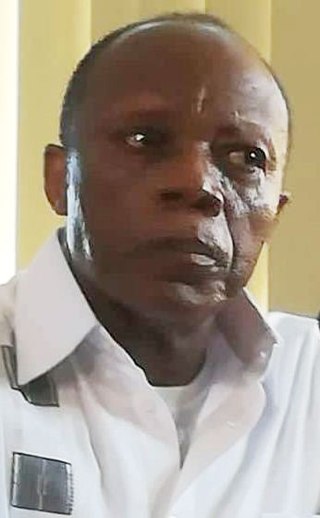
Denis Sassou Nguesso is a Congolese politician and former military officer who became president of the Republic of the Congo in 1997. He served a previous term as president from 1979 to 1992. During his first period as president, he headed the Congolese Party of Labour (PCT) for 12 years. He introduced multiparty politics in 1990, but was stripped of executive powers by the 1991 National Conference, remaining in office as a ceremonial head of state. He stood as a candidate in the 1992 presidential election but placed third.

Pierre Joseph Auguste Messmer was a French Gaullist politician. He served as Minister of Armies under Charles de Gaulle from 1960 to 1969 – the longest serving since Étienne François, duc de Choiseul under Louis XV – and then as Prime Minister under Georges Pompidou from 1972 to 1974. A member of the French Foreign Legion, he was considered one of the historical Gaullists, and died aged 91 in the military hospital of the Val-de-Grâce in August 2007. He was elected a member of the Académie française in 1999; his seat was taken over by Simone Veil.

Robert Denard was a French mercenary. He served as the de facto military leader of the Comoros twice with him first serving from 13 May 1978 to 15 December 1989 and again briefly from the 28 September to 5 October in 1995. Sometimes known under the aliases Gilbert Bourgeaud and Saïd Mustapha Mhadjou, he was known for having performed various jobs in support of Françafrique—France's sphere of influence in its former colonies in Africa—for Jacques Foccart, co-ordinator of President Charles de Gaulle's African policy.

The Congolese Party of Labour is the ruling party of the Republic of the Congo. Founded in 1969 by Marien Ngouabi, it was originally a pro-Soviet, Marxist–Leninist vanguard party which founded the People's Republic of the Congo. It took a more moderate left-wing stance following the dissolution of the Soviet Union in 1991 and adopted social democracy as its principal ideology in 2006. Denis Sassou Nguesso is the President of the PCT Central Committee, and Pierre Moussa is the Secretary-General of the PCT.
Operation Argon was an unsuccessful military operation carried out by South African special forces in May 1985 with the objective of destroying six fuel storage tanks at Malongo in Angola's Cabinda exclave.

Many people of European heritage in South Africa are descended from Huguenots. Most of these originally settled in the Cape Colony, but were absorbed into the Afrikaner and Afrikaans-speaking population, because they had religious similarities to the Dutch colonists.

Jean-Baptiste Tati Loutard was a Congolese politician and poet. Having previously served as Minister of Higher Education and Minister of Arts and Culture, he was Minister of Hydrocarbons in the government of Congo-Brazzaville from 1997 to 2009; he was also the founder and President of the Action Movement for Renewal (MAR), a political party. Aside from politics, Tati Loutard published numerous books of his own poetry and literature in general.
Jean-Martin Mbemba is a Congolese politician and lawyer. He is the President of the Union for Progress (UP) and has been a prominent politician in Congo-Brazzaville since the early 1990s. He served in the 1991–1992 transitional government as Minister of Justice; later, under President Denis Sassou Nguesso, he was Minister of Labour and Social Security from 1997 to 1999, Minister of Justice from 1999 to 2005, and Minister of State for the Civil Service and State Reform from 2005 to 2009. Since October 2009, he has been the President of the National Commission of Human Rights.

The Order of Agricultural Merit is an order of merit bestowed by the French Republic for outstanding contributions to agriculture. When it was created in 1883, it was second in importance only to the Legion of Honour within the French order of precedence.
Jeannou Lacaze, was a French Général d'armée of the French Army and Chef d'État-Major des armées (1981-1985), who also served in the French Foreign Legion.
Plot For Peace is a 2013 South African documentary directed by Carlos Agulló and Mandy Jacobson.

The Ordre national du Mérite is a French order of merit with membership awarded by the President of the French Republic, founded on 3 December 1963 by President Charles de Gaulle. The reason for the order's establishment was twofold: to replace the large number of ministerial orders previously awarded by the ministries; and to create an award that can be awarded at a lower level than the Legion of Honour, which is generally reserved for French citizens. It comprises about 185,000 members; 306,000 members have been admitted or promoted in 50 years.
Jean-Paul Pigasse is a Brazzaville-based French journalist and media proprietor.
Rigobert Roger Andely, is a Congolese central banker and academic specializing in monetary and banking economics. He was Vice-Governor of the Bank of Central African States (BEAC) from 1998 to 2002, Minister of Finance in the government of Congo-Brazzaville from 2002 to 2005, and Vice-Governor of the BEAC again from 2005 to 2010.

Admiral Georges Cabanier was a French Naval Officer and Admiral, in addition to Grand Chancellor of the Legion of Honour.

Rhode Bath-Schéba Makoumbou is an artist from the Republic of the Congo. Working in oil painting and sculpture, she has exhibited around the world. She works from Brussels and Brazzaville. In 2012 she won the Grand Prix of Arts and Letter of the President of the Republic and the next year was appointed an officer in the Ordre du Dévouement Congolais.
The Brazzaville Foundation is an independent, non-profit organisation based in London. Its goal is to develop initiatives, primarily in Africa, in the fields of conflict prevention and resolution, development, the environment and conservation and to bring countries together in peaceful cooperation. It was first registered in the United Kingdom with the Charity Commission in 2015 and granted special consultative status by the UN Economic and Social Council in 2018.
Aleth Félix-Tchicaya is a writer and development worker from the Republic of the Congo, who founded the charity 'Les enfants d'Aleth' which addresses child homelessness.

Paulin Makaya is a politician born in 1966 in Brazzaville, Republic of the Congo. A former collaborator of Bernard Kolélas, he was the founding president of “United for the Congo”, an opposition party.

Jean-Marie Michel Mokoko is a Congolese general and politician. He served as Chief of General Staff of the Armed Forces of the Republic of the Congo and was advisor to President Denis Sassou-Nguesso. He was a candidate for the presidential election of March 2016, where he won 13.74% of the vote and came third out of nine candidates. He did not recognize the re-election of Denis Sassou Nguesso, who had been in power for more than 35 years, and called for civil disobedience. He was arrested in June 2016 and sentenced on 11 May 2018 to 20 years in prison for "endangering the internal security of the state".












